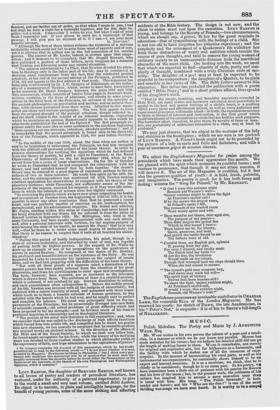LUCY' BARTON, the daughter of BERNARD BARTON, well known to
all lovers of poetry and readers of periodical literature, has ventured, under the authority of a paternal imprimatur, to give to the world a small and very neat volume, entitled Bible Letters. Its object is to narrate, in plain and intelligible language, for the benefit of young persons, some of the more striking and affecting ncidents of the Bible history. The design is not new, and the claim to notice must rest upon the execution. LUCY BARTON is young, and belongs to the Society of Friends,—two circumstances, which we should say, d priori, fit her for the great requisite in education—that of sympathizing with the feelings of a child. She is not too old to have forgotten her infantine experience; and the simplicity and the retirement of a Quakeress's life withdraw her from those distractions of vanity and ambition which trouble the course of pure thoughts, and tend to remove the young woman of ordinary society to an immeasurable distance from the inartificial character of the mere child. On looking into the work, we meet that which we expected to find—chastity of style, purity and sim- plicity of thought, combined with a truly Christian code of mo- rality. The daughter of a poet may at least be expected to be graceful in her composition ; the daughter of a Quaker, to be plain and sensible in her views of life. The Bible Letters answer to this character. Her father has preluded the publication with a poem entitled "Bible Days ;" and in a short preface affixed, thus speaks of his daughter's work.
"That in the simple, touching, and beautiful narratives recorded in Holy Writ, are many scenes and incidents calculated most powerfully to appeal to the best and purest feelings of a child's heart, is a position which every pious and affectionate parent, as well as every judicious and experienced preceptor, will readily admit : in truth, the repeated recurrence to them as themes of interest and instruction, is the best proof which could beadduced of the estimation in which they are held for such purposes. The humblest effort, therefore, to give them, by novelty of form or man- ner, any probability of additional attraction to a child, may at least be pardoned."
We may just observe, that we object to the costume of the lady and children in the frontispiece ; which we are sure is no portrait of LUCY BARTON. A Friend's book ought not to be preceded by the picture of a lady in curls and frills and furbelows, and with a pair of enormous gigot de mouton sleeves.


























 Previous page
Previous page